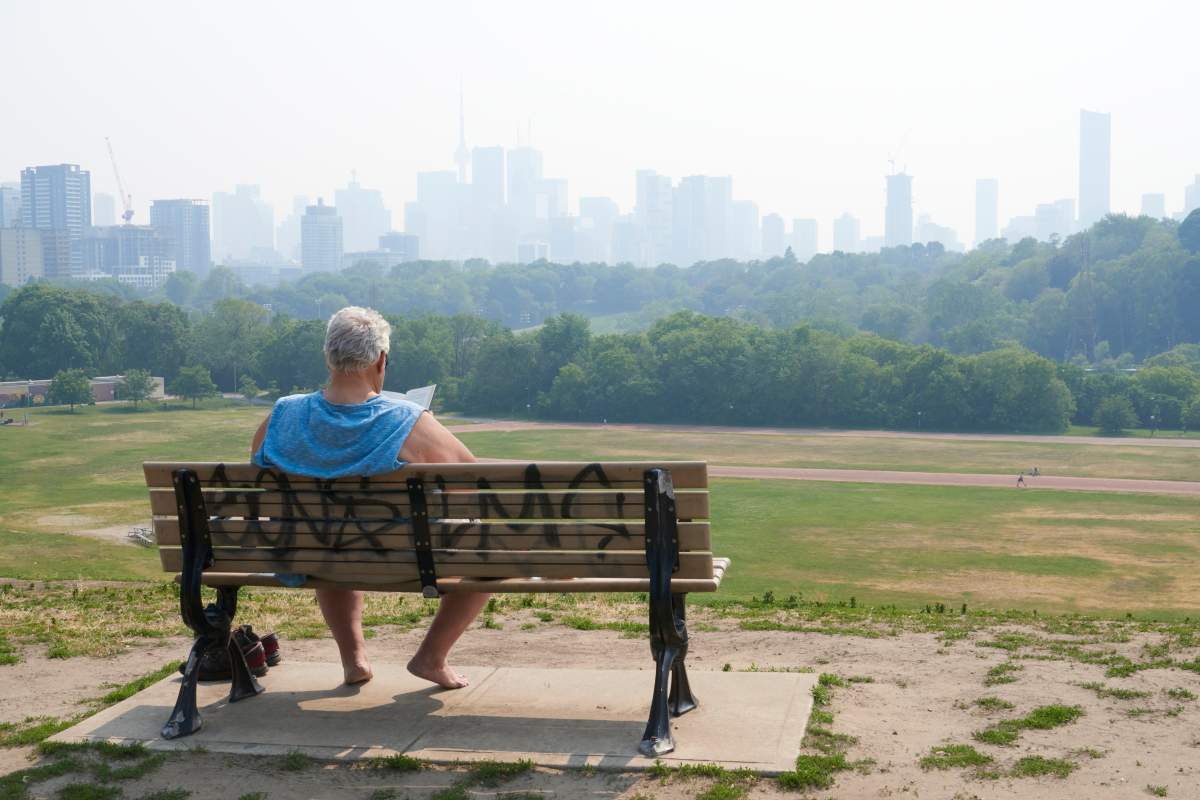Wildfires burning in northeastern Ontario and Quebec have prompted Environment Canada to issue a special air quality statement for the London region.

The national weather agency said in a statement that smoke plumes from forest fires over northeastern Ontario and Quebec will move into the area into Tuesday afternoon and evening, resulting in deteriorated air quality.
The special air quality statement remains in effect for London, Middlesex, Elgin, Grey-Bruce, Huron-Perth, Sarnia-Lambton, Waterloo-Wellington, Windsor-Essex, and Chatham-Kent.
“Wildfire smoke can be harmful to everyone’s health even at low concentrations,” Environment Canada wrote in a statement. “People with lung disease, such as asthma or heart disease, older adults, children, pregnant people, and people who work outdoors are at higher risk of experiencing health effects caused by wildfire smoke.”
The Middlesex London Health Unit (MLHU) reported that as of 1 p.m. on Tuesday, the local Air Quality Health Index (AQHI) stood at a low risk. However, the health unit indicated that it is projected to reach levels under a high risk by Wednesday morning.
“When Environment Canada issues special air quality statements, it’s important for people to be aware of how they are feeling when they exert themselves or spend time outside. The reduced air quality is usually felt more by people who are at greater risk, particularly those with heart or respiratory conditions,” said Dr. Alex Summers, medical officer of health with MLHU. “We‘re not currently recommending that people reduce or reschedule outdoor activities and events, but we do want to remind them to monitor how they’re feeling, especially if breathing becomes difficult. If that happens, they should stop their activities and go to a space where there is clean, cool air.”

Get daily National news
According to Air Quality Ontario, as of 12 a.m. Wednesday, the AQHI for the London region reached 10+, also referred to as a very high risk. Forecasted to continue around that same rate throughout the day, conditions are expected to improve for some areas by Thursday night.
- Vancouver airport ties Nexus outage to U.S. partial government shutdown
- Federal government raises concerns over OpenAI safety measures after B.C. tragedy
- Ipsos poll suggests Canada more united than in 2019, despite Alberta tensions
- Indigenous leaders outline priorities for spring sitting of Parliament
However, Steven Flisfeder, warning preparedness meteorologist with Environment Canada, said that’s dependent on the state of the wildfires.
“As long as those fires are burning, there’s going to be the potential for reduced air quality from the smoke,” he said. “Should the fire situation improve, which we all hope it will, that could reduce the amount of pollutants in the air and therefore improve the situation in terms of air quality across southern Ontario.”
Until then, the weather agency advises residents to keep indoor air clean, use an air purifier with a high-efficiency particulate air (HEPA) filter and avoid air purifiers that produce ozone.
“If you must spend time outdoors, a well-fitted respirator type mask, such as a NIOSH certified N95 or equivalent respirator, that does not allow air to pass through small openings between the mask and face, can help reduce your exposure to the fine particles in smoke,” read the statement.
Flisfeder advised the same, saying that “if you have to be outside, wearing a mask can help; no one thing is going to protect you fully.”
“The more layers of protection you add, the better you can improve the situation for yourself.”
Environment Canada also advises residents to stop outdoor activities if they experience “shortness of breath, wheezing, including asthma attacks, severe cough, dizziness or chest pains.”
“Stay inside if you are feeling unwell and experiencing symptoms.”












Comments
Want to discuss? Please read our Commenting Policy first.